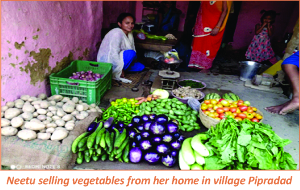Reimagining Entrepreneurship
in this New World
Till
a month ago, it was business as usual for Neetu who runs a tailoring unit
from Mirzapur, Uttar Pradesh. But COVID-19 has started taking a toll on her
business along with many other micro entrepreneurs like her. The global
pandemic is already changing lives, and for many, life will take an even
stranger turn over the next few weeks, months and maybe even years. Things
will not be the same, especially for those who dared to venture out of the
comfort of their 9-to-5 jobs and started a business. Talking about the
impact of the crisis, Neetu shares, “I heard about a virus affecting China,
but never thought it would reach my village or impact my business. Many
entrepreneurs including me are being forced to take drastic steps and we are
fearful about our future.”

The sudden countrywide lockdown allowed only shops selling essential items to remain open. Despite the challenges, Neetu started looking at leveraging opportunities to improve her business in the current scenario. To cater to the essential needs of her village Pipradad, Neetu added vegetables and some basic grocery items to her shop. As she used to run her former enterprise from her house itself, there was no need to rework on the infrastructure. She just converted her sewing room into a retail shop and hired her cousin to get products and vegetables from the market.
Neetu is a member of the Work 4 Progress (W4P) programme of the ‘la Caixa’ Foundation and Development Alternatives. The programme is operational in 80 villages of Eastern Uttar Pradesh and Bundelkhand and adopts a social innovation approach for entrepreneurship led job-creation.
Having a shop on the main road is helping Neetu to attract a large customer base. One of her customer’s, a 30 year old woman shares, “The news of lockdown completely shook us. I thought there will be unavailability of grocery items but in a few days Neetu opened her vegetable shop and now we can get all our items in the village only.”
Many entrepreneurs like Neetu are relooking at their business models to be operational during the crisis. Neetu says that the virus is offering us too many lessons on both personal and professional fronts. Many of her entrepreneur friends were forced to close their shops but many are keeping their business operational by either diversifying or operating from their homes.
The lockdown has also rekindled the love and need for local products. Customers are preferring locally available products because of commuting restrictions which is enabling entrepreneurs to understand the local needs and work accordingly. Tara Shankar, owner of a dairy farm from Mirzapur shares, “Enterprises operating from villages are benefitting, as people have started valuing local products. It is also an important time to build a customer base by providing quality goods and services.”
W4P with its partners and prototypes is working towards innovating and adapting strategies that can survive the crisis. Through its digital chat groups, it’s not only disseminating regular and much needed information but also identifying triggers that can help in leveraging local resources to help the communities during the pandemic. Many of the entrepreneurs including Neetu are coming up with innovative solutions to sustain their enterprises in these difficult times.
Many entrepreneurs are also focusing on livestock rearing and farming as the demand for agriculture produce is high and will get them a decent price in the market as well. With the W4P team, the entrepreneurs have been working towards:
-
Planning for the next three months (keeping in mind low revenues)
-
Avoiding large purchases and focusing on what can be added to the enterprise to keep it running
-
Being in touch with local support bodies like civil society groups and government agencies
-
Adapting to the situation and evolving
In difficult times like this, it becomes even more important to ‘listen’ and keep people and their work at the centre. There is a need to create systems that are resilient and flexible enough to adapt to the changes in these highly uncertain times. ■
Small bio of guest author
Anuj Srivastava
Mr. Anuj Srivastava is Chief Functionary and Director at Swami Vivekanand
Shiksha Samiti. Over the years, he has worked on projects related to
education, empowerment, child rights, poverty alleviation and creation of
livelihood opportunities for the bottom of the pyramid.
Upma Singh
usingh@devalt.org
and Anuj Srivastava
svssindia@rediffmail.com